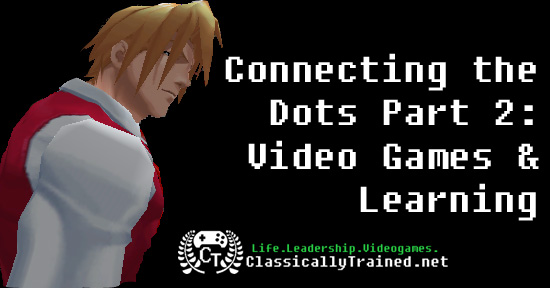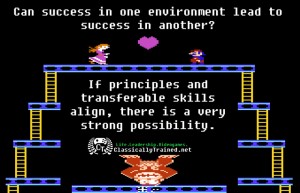
This is part 2 of Connecting the Dots, for part one go HERE

Concept Three: You Can Learn Without Knowing It
What excites me about the potential for learning principles from video games, is the possibility it can be done without the learner even being actively aware that they are learning.
In a previous post, I detailed a problem solving approach that discovers how many difficult problems may already be resolved by individuals who are completely unaware they are doing anything different from everyone else. This approach, called Positive Deviance, depends on the problem solver often being ignorant of their own solution, but simply doing things differently because “that’s just the way I do it.”
Leveling Up Development
Another important component to knowledge is developmental levels. Ken Blanchard’s Situational Leadership model includes a specific framework that also addresses individual development.
This approach identifies two determinants of both learning and performance: Competence and Commitment.
Competence
Knowing what to do and how to do it. When playing a video game, the player spends a significant amount of time learning the game. The time spent varies game to game, but each new game brings with it a control scheme, game mechanics, and specific goal within the game.
A new player must invest time and work at understanding the “what” and the “how” of the video game to enjoy it. Just because I am highly competitive in Rival Schools does not mean I am automatically good at Power Stone or The Last Blade.
Confidence is developed as belief in one’s ability to perform a task or achieve the desired outcome in a successful fashion. I can have confidence that I can successfully complete the first stage in Battletoads but lack confidence that I can ever finish the speeder bike stage in the same game.
In this way, confidence is specific to a particular task or goal.
What about the skills or abilities that can be learned in one context and applied to another?
I have been playing video games for over 30 years, and I would say I have an advantage in learning a video game’s play mechanics over someone who is less familiar with video games.
This begs the question: do some of the skills or knowledge acquired while playing previous video games aid me in quickly understanding newer games I have yet to experience?
If that is true, then what might be the possibility that skills learned in video games can be gained and transferred to life in the same way?
Were this the case (and I believe it is) then these skills would qualify as “transferable skills.” Consider that often, transferable skills include the capacity to analyze, store and retrieve information, as well as using past information in new contexts. This is why fans of one genre of video game can often pick up a new game in the same genre with a minimal learning curve.
4 Stages of Mastery
When approaching the subject of mastery, there are four distinct levels to consider (in order): Unconscious Incompetence, Conscious Incompetence, Conscious Competence, and Unconscious Competence.
Unconscious Incompetence
This is the individual who picks up a new video game unlike anything they have ever played. At first they expect to be good at it, only to find that their skills are lacking. They are terrible, the truth be told, but they don’t know it yet – hence, the unconscious part of their incompetence.
Conscious Incompetence
This individual openly admits that they do not understand what they are doing, but they are willing to learn. This is a fine place for any beginner to be since there exists an openness to learning and a humility that allows for quicker growth. In this stage we begin to learn how little we know about a subject, or in this case, a game.
Conscious Competence
Next is the individual who is learning and acquiring a good skill set. The rules of the game have set in, but effort is still required to remember button pressing combinations or which spell to use against which enemy. Slowly getting better, and almost there.
Unconscious Competence
The final stage is reserved for the individual who no longer has to think about which button to press or which weapon to select, but can handle quick and complicated responses without even needing to think about it. This is a high degree of mastery.
Transferable Competence
What if we applied the concepts of competence and consciousness to transferable skills? I submit for consideration the individual who has achieved a high level of competence in a transferable skill, but they are unaware that this skill can serve them in a completely different context. This Unconscious Transferable Competence could be the key to unlocking the significant potential of video games to set individuals up for success in reality.
Can success in one environment lead to success in another? If principles and transferable skills align, there is a very strong possibility.
10,000 Hours of Gameplay
A key element of being an Unconscious Transferable Competent is a high degree of practice of the skill in question. In Malcolm Gladwell’s frequently quoted work Outliers, he references the 10,000 hour rule which represents the quantity of time that must be spent studying a subject to be considered an expert.
Is it within the realm of possibility that many gamers spend 10,000 hours or more playing video games? Jane McGonigal makes the case that the average young person accomplishes  this feat before reaching their 21st birthday.
this feat before reaching their 21st birthday.
What exactly are the Unconscious Transferable Competencies that are being developed during these 10,000 hours? A list of skills that resembles the needed skills lacking in leadership to achieve a more dynamic workplace: Strategic Planning, Change Management, Knowledge Sharing, Listening, Innovation, Adaptability, Teamwork, Learning, and Collaboration.
If the needed skills are being learned, the million dollar question is why are they not showing up in the workplace?
Concept Four: What You Can Do Only Matters If You Know When To Do It
Once competencies have been built the next step would require an effort of connecting the dots to move from self-efficacy in one realm to self-efficacy in another. To gain and sustain performance, an individual needs to know “what” and “how” (competence), as well as have a belief in his or her abilities (confidence) and a desire to achieve an outcome (motivation).
If I am unaware that I am doing something a certain way, then how can I improve my performance?
An example of a skill inherent to video games, but benefits the player through illumination is problem solving and the scientific method.
Successful Problem Solving
Considering that video games are problem solving simulators, what are elements of the required problem solving skills found in video games that can be transferred to real life situations? Could it be possible that Massive Multiplayer Online games (MMOs) like World of Warcraft can teach and build efficacy with the scientific method, for example?
One possible starting point for realizing what type of transferable skills exist within games is self-awareness. As we become self-aware of the behaviors that have potential for transferability, the likelihood of noticing more skills that meet this criteria will increase.
A good universal set of skills that games teach is discussed at length in Everything Bad is Good For You by Steven Johnson where decision-making is observed within video games. How a player seeks, interacts, and decides within the video game can be split into two distinct techniques: probing, and telescoping.
Johnson describes probing as engaging with the environment and actively learning the consequences that specific behaviors create.
Essentially this is a real-time interaction within the system, much like trial and error. This is the scientific method that James Paul Gee describes: Probe, Hypothesize, Re-Probe, and rethink approach.
Probing seeks to find the edge or outer limits or boundaries of what the game can do. It is only when you understand the size and shape of the box that you can either think outside the box or learn to be successful within it.
The scientific method and its application throughout the video game world can be seen in research by Steinkuehler and Duncan.
In Scientific Habits of Mind in Virtual Worlds, Constance Steinkuehler and Sean Duncan discover several remarkable findings among avid fans of Massive Multiplayer Online games.
The research examined the nature of conversations taking place on the official World of Warcraft forums. Understanding and application of the scientific method, evaluative thinking, social knowledge construction, systems based reasoning, and model based approaches were identified in this study. Rather intense subjects for what many have dismissed as “just a game.”
This in itself is an amazing tool for teaching and understanding a highly transferable skill, yet there remains another skill that is potentially more helpful at the leadership level within organizations and groups – this skill is referred to as Telescoping.
Telescoping is when the game player can engage in the ability to track many different tasks and goals that range from immediate and short-term all the way through long-term and global/enterprise level goals.
This is not multitasking, but rather project management in a dynamic environment. This skill is key to being successful as a manager, supervisor, or director within an organization, and vital to top executives.
What other transferable skills might be possible from video games?